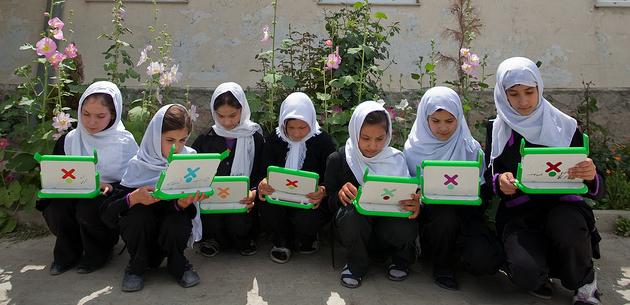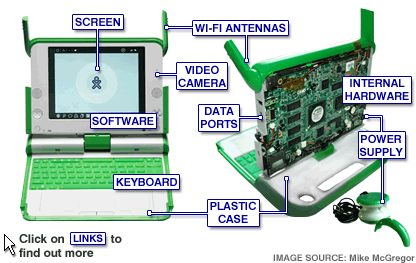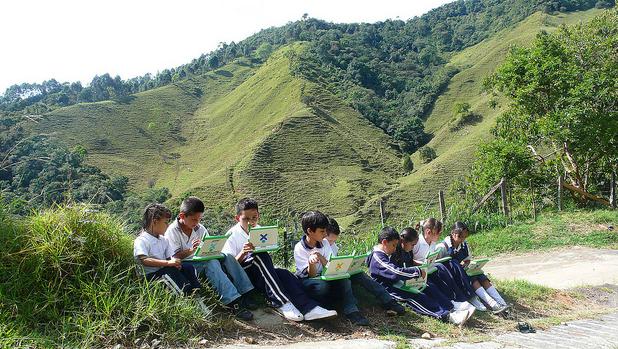One Laptop per Child (OLPC) is a non-profit organization trying to address the lack of resources many Third World Countries struggle with and how these affect education and hinder technological development. Keeping in mind that many countries can only afford to spend $20 per child per year on education (compared to about $7,500 that the USA spends), OLPC tries to circumvent traditional approaches to the situation, and instead want to make available the tools that can allow children to explore and learn on their own. OLPC feel that efforts should continue to build school and train teachers in the poorest corners of the world, but simultaneously wants to try a more direct approach. The idea is to transform these children with personal laptops into teachers. Each child can explore the world on their machine, and will later be able to teacher elders and other children about what they have learned; in this way the entire community can benefit.
These laptops are designed for use by the world’s poorest children. They run on open source software, keeping in mind that while all children won’t become programmers, they should have the opportunity to continue growing without constrains by their equipment. The machine itself is designed to run on very low power, and some of the earliest models were powered through cranking, or with a foot-pedal. The display must also be sunlight-readable, since most children will be outdoors when working on their laptops. The machine itself is small, light and has a handle for easy carrying. It also has a monitor which rotates, allowing for others to participate.
This program was first designed to involved governments into buying laptops for children, and initial conversations involved proposals for Brazil, Argentina, Libya, Nigeria and Thailand. Recently Uruguay and Rwanda have also joined in. Currently the program continues to grow through donations by individuals, businesses and foundations.
If you want to learn more about the project visit their site and their wiki. You can find information on donating and participating here.
04.03.07 – I just found a webcast by Walter Bender, president of OLPC, discussing this project; you can access it here. There is another webcast by Nicolas P. Negroponte, chairman and co-founder of OLPC,which can be accessed here.
04.17.07 – The OLPC interface runs on a lightweight version of Fedora Linux, called Sugar. You can take a look at it here.
07.15.07 – Intel has just joined forces with OLPC, after creating competition for each other, in trying to offer low cost computers to children in the developing world. Currently there is no talk about changing processing chips, yet the idea is to develop a variety of low cost computers in the future that can function of a variety of platforms. Intel has been producing the Classmate for sale in developing countries at a cost of US $200.00. You can read more about this in an article by the BBC.
07.23.07 – After much anticipation and testing, OLPC is posed to start massive production, explaining that they finally have orders large enough to make the project viable. You can read more about this at an article by the BBC. And here is another article explaining the different components of the laptop and how they work.
06.08.07 – It seems that everyone is in a rush to grab a piece of the computer market in the developing world. Today the BBC has an article about other major computer producers rushing towards this market, although they differ form the OLPC project in that these other companies are out just to make some money. Beijing based Levono has announced a low cost computer that can be plugged into the TV
10.29.30- Uruguay just became the first country to buy a large number of these computers to make available to children 6 – 12. They hope to make these laptops available to every children in the country by 2009. You can read more about this in an article from the BBC.
11.15.07 – “Give One – Get One” has started for the USA and Canada and will run until November 26, 2007. You can order yours here.
One Laptop per Child (OLPC) es una organización sin fines de lucro tratando de resolver la falta de recursos vivida en muchos lugares del Tercer Mundo y cómo estos afectan la educación y obstaculizan el desarrollo tecnológico. Teniendo en cuenta que muchos países sólo pueden gastar $20 por niño por año en educación (en comparación con cerca de 7.500 dólares que EE.UU. gasta), la OLPC intenta sobrepasar los enfoques tradicionales de la situación y en su lugar desea poner a disposición las herramientas que pueden permitir a los niños explorar y aprender por su propia cuenta. OLPC sienten que los esfuerzos deben continuar para construir escuelas y formar maestros en los rincones más pobres del mundo pero a la vez quiere probar un acercamiento más directo. La idea es transformar a estos niños con computadoras portátiles personales en profesores. Cada niño puede explorar el mundo en su máquina y más tarde será capaz de compartir este conocimiento con sus maestros y otros niños, de esta manera toda la comunidad pueda beneficiarse.
Estos portátiles están diseñados para uso con los niños más pobres del mundo. Los computadores funcionan con software de código abierto teniendo en cuenta que si bien no todos los niños se convertirán en programadores, si deben tener la oportunidad de continuar creciendo sin limitaciones por su equipo. La máquina en sí está diseñado para funcionar con una corriente eléctrica muy baja y algunos de los primeros modelos se cargan a través una manivela, o con un pedal. La pantalla también debe ser legible bajo luz solar, ya que la mayoría de los niños estarán al aire libre cuando estén trabaja en sus computadoras portátiles. La máquina en sí es pequeña, ligera y tiene un agarradera para facilitar su transporte. También cuenta con un monitor que rota, lo que permite a otros a participar.
Este programa fue diseñado por primera vez para negociar con gobiernos involucrados en la compra de computadores portátiles para los niños. En la conversaciones iniciales incluían propuestas para la participación de Brasil, Argentina, Libia, Nigeria y Tailandia. Recientemente, Uruguay y Rwanda también se han unido. Actualmente el programa sigue creciendo a través de donaciones de particulares, empresas y fundaciones.
Si desea obtener más información sobre el proyecto visite su sitio web y en su wiki. Puede encontrar información sobre la donación y participar aquí.
04.03.07 – Acabo de encontrar un webcast por Walter Bender, presidente de OLPC, hablando de este proyecto, se puede acceder a él aquí. Hay otro webcast por Nicolas P. Negroponte, presidente y co-fundador de OLPC que se puede acceder aquí.
04.17.07 – La interfaz de OLPC funciona con una versión ligera de Fedora Linux, llamado Sugar. Puede echar un vistazo a aquí.
07.15.07 – Intel ha unido sus fuerzas con OLP, después de hacerse la competencia unos a otros, para tratar de ofrecer ordenadores de bajo costo a los niños en el tercer mundo. Actualmente no se habla sobre el cambio de chips de procesamiento, pero la idea es desarrollar una variedad de computadoras de bajo costo en el futuro que puede funcionar de una variedad de plataformas. Intel ha estado produciendo el Classmate en venta en los países en desarrollo a un costo de EE.UU. $ 200.00. Puede leer más sobre esto en un artículo de la BBC.
07.23.07 – Después de mucha anticipación y las pruebas la OLPC se plantea comenzar la producción masiva, explicando que finalmente tienen órdenes lo suficientemente grande como para hacer viable el proyecto. Puede leer más sobre esto en un artículo de la BBC. Y aquí hay otro artículo que explica los diferentes componentes de la computadora portátil y su funcionamiento.
06.08.07 – Parece que todo el mundo tiene prisa para tomar un pedazo del mercado de las computadoras en el mundo en desarrollo. Hoy la BBC tiene un artículo acerca de otros productores importantes de la computadora guiadas a este mercado, y aunque difieren del proyecto OLPC, en que estas otras empresas simplemente buscan ganar dinero. Levono, basada en Beijin, ha anunciado un equipo de bajo costo que puede ser conectado a la TV
10.29.30-Uruguay acaba de convertirse en el primer país en comprar un gran número de estos equipos para ponerlos a disposición de los niños entre 6 – 12 años. Tienen la esperanza de que estos portátiles estén a disposición de todos los niños en el país antes del 2009. Puede leer más sobre esto en un artículo de la BBC.
11.15.07 – “Give One – Get One” ha comenzado para los EE.UU. y Canadá, y se extenderá hasta el 26 de noviembre 2007. Usted puede pedir el suyo aquí.



Bilingual Librarian » Boston Book Festival, 2010
[…] at the festival I chatted for a while with the OLPC folk, saw some of the local NPR personalities, and browsed a lot of interesting books. I also saw […]
Updates on the OLPC Project at Bilingual Librarian
[…] OLPC has reinvented their signature laptop and come out with a new model that looks more like an […]
Updates on the OLPC Project « colombianflowers
[…] in Americas, Colombia, Latin America, Technology, World at 7:38 pm by colombianflowers The OLPC has reinvented their signature laptop and come out with a new model that looks more like an […]
Clever designs « colombianflowers
[…] which kills bacteria as water is sucked through it. Another one of the projects highlighted is the One Laptop per Child initiative, which aims at narrowing the digital divide between the rich and the […]